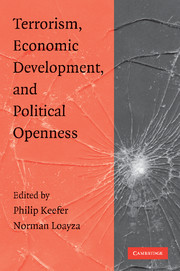Crossref Citations
This Book has been
cited by the following publications. This list is generated based on data provided by Crossref.
Sánchez-Cuenca, Ignacio
and
de la Calle, Luis
2009.
Domestic Terrorism: The Hidden Side of Political Violence.
Annual Review of Political Science,
Vol. 12,
Issue. 1,
p.
31.
Gupta, Dipak K.
2009.
Global Spread of Radical Ideologies.
India Quarterly: A Journal of International Affairs,
Vol. 65,
Issue. 2,
p.
109.
Dornschneider, Stephanie
2010.
Belief systems and action inferences as a source of violence in the name of Islam.
Dynamics of Asymmetric Conflict,
Vol. 3,
Issue. 3,
p.
223.
Sandler, Todd
2010.
Terrorism and Policy: Introduction.
Journal of Conflict Resolution,
Vol. 54,
Issue. 2,
p.
203.
Llussá, Fernanda
and
Tavares, José
2011.
THE ECONOMICS OF TERRORISM: A (SIMPLE) TAXONOMY OF THE LITERATURE.
Defence and Peace Economics,
Vol. 22,
Issue. 2,
p.
105.
Gaibulloev, Khusrav
and
Sandler, Todd
2011.
The adverse effect of transnational and domestic terrorism on growth in Africa.
Journal of Peace Research,
Vol. 48,
Issue. 3,
p.
355.
Sandler, Todd
2011.
New frontiers of terrorism research: An introduction.
Journal of Peace Research,
Vol. 48,
Issue. 3,
p.
279.
Cederman, L. -E.
Conte, R.
Helbing, D.
Nowak, A.
Schweitzer, F.
and
Vespignani, A.
2012.
Exploratory of society.
The European Physical Journal Special Topics,
Vol. 214,
Issue. 1,
p.
347.
KHUSRAV, GAIBULLOEV
TODD, SANDLER
and
DONGGYU, SUL
2013.
COMMON DRIVERS OF TRANSNATIONAL TERRORISM: PRINCIPAL COMPONENT ANALYSIS.
Economic Inquiry,
Vol. 51,
Issue. 1,
p.
707.
Early, Bryan R.
Fuhrmann, Matthew
and
Li, Quan
2013.
Atoms for Terror? Nuclear Programs and Non-Catastrophic Nuclear and Radiological Terrorism.
British Journal of Political Science,
Vol. 43,
Issue. 4,
p.
915.
BUESA, MIKEL
and
BAUMERT, THOMAS
2013.
UNTANGLING ETA’S FINANCE: AN IN-DEPTH ANALYSIS OF THE BASQUE TERRORIST'S ECONOMIC NETWORK AND THE MONEY IT HANDLES.
Defence and Peace Economics,
Vol. 24,
Issue. 4,
p.
317.
Meierrieks, Daniel
and
Gries, Thomas
2013.
Causality between terrorism and economic growth.
Journal of Peace Research,
Vol. 50,
Issue. 1,
p.
91.
Bandyopadhyay, Subhayu
Sandler, Todd
and
Younas, Javed
2014.
Foreign direct investment, aid, and terrorism.
Oxford Economic Papers,
Vol. 66,
Issue. 1,
p.
25.
Racioppi, Linda
and
Tremonte, Colleen
2014.
Geopolitics, Gender, and Genre: The Work of Pre-Title/Title Sequences in James Bond Films.
Journal of Film and Video,
Vol. 66,
Issue. 2,
p.
15.
Brasted, Howard
and
Ahmed, Zahid Shahab
2015.
The Political Economy of Conflict in South Asia.
p.
114.
Kayaoglu, Aysegul
2016.
Socioeconomic impact of conflict: state of emergency ruling in Turkey.
Defence and Peace Economics,
Vol. 27,
Issue. 1,
p.
117.
Choi, Seung-Whan
and
Piazza, James A.
2016.
Ethnic groups, political exclusion and domestic terrorism.
Defence and Peace Economics,
Vol. 27,
Issue. 1,
p.
37.
Lyngsø Jørgensen, Jakob
and
Breum Nielsen, Christoffer
2017.
The Responsive Global Organization.
p.
205.
van Gils, Eske
and
Yörük, Erdem
2017.
The World Bank’s social assistance recommendations for developing and transition countries: Containment of political unrest and mobilization of political support.
Current Sociology,
Vol. 65,
Issue. 1,
p.
113.
Paul, Jomon Aliyas
and
Bagchi, Aniruddha
2018.
Does Terrorism Increase after a Natural Disaster? An Analysis based upon Property Damage.
Defence and Peace Economics,
Vol. 29,
Issue. 4,
p.
407.



